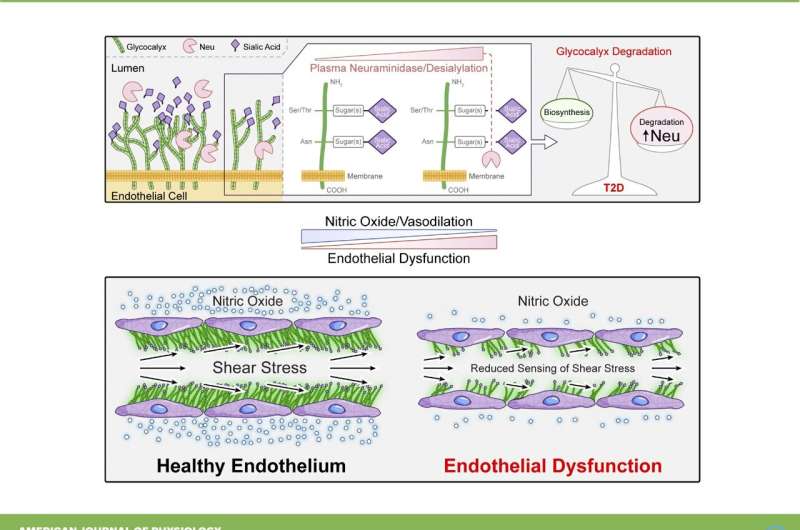This article has been reviewed according to Science X's editorial process and policies. Editors have highlighted the following attributes while ensuring the content's credibility:
fact-checked
trusted source
proofread
Researchers uncover potential treatment for cardiovascular complications from type 2 diabetes

New research at the Roy Blunt NextGen Precision Health building has discovered a potential treatment for an underlying cause of cardiovascular disease in people with type 2 diabetes.
More than 30 million Americans live with type 2 diabetes. One common feature of diabetes is the hardening and inflexibility of blood vessels caused by damage to the endothelial cells in the vascular system.
Over time, this can lead to the development and progression of cardiovascular disease, which is the number one cause of death in diabetics. Because endothelial dysfunction is causally linked to cardiovascular disease, there is a considerable need to identify new therapeutic targets to improve endothelial function in type 2 diabetics.
A research team from the University of Missouri has found that neuraminidase activity is elevated in the circulation of type 2 diabetic mice and humans. In a series of mechanistic experiments in cultured endothelial cells and isolated blood vessels, they were able to link increased neuraminidase to endothelial dysfunction.
"Because we know that type 2 diabetics have this increased neuraminidase circulating in their blood and that the presence of it promotes endothelial dysfunction, it is important to target it as a means of addressing the cardiovascular complications faced by those with type 2 diabetes," said Luis Martinez-Lemus, DVM, Ph.D., James O. Davis distinguished professor in cardiovascular research at the University of Missouri School of Medicine.
The team also found that neuraminidase inhibition using zanamivir, an oral inhalation drug used to treat the flu virus, improved endothelial function in diabetic mice.
"This research lays out the molecular mechanisms by which neuraminidase promotes endothelial dysfunction, and these mechanisms can be exploited therapeutically," said Jaume Padilla, Ph.D., an associate professor of nutrition and exercise physiology at MU. "Improving vascular function in people with type 2 diabetes can help them live longer and better lives, which is why this research is so important."
"Neuraminidase inhibition improves endothelial function in diabetic mice" and "Neuraminidase-induced externalization of phosphatidylserine activates ADAM17 and impairs insulin signaling in endothelial cells" were recently published in the American Journal of Physiology-Heart and Circulatory Physiology.
More information: Christopher A. Foote et al, Neuraminidase inhibition improves endothelial function in diabetic mice, American Journal of Physiology-Heart and Circulatory Physiology (2023). DOI: 10.1152/ajpheart.00337.2023
Larissa Ferreira-Santos et al, Neuraminidase-induced externalization of phosphatidylserine activates ADAM17 and impairs insulin signaling in endothelial cells, American Journal of Physiology-Heart and Circulatory Physiology (2023). DOI: 10.1152/ajpheart.00638.2023




















